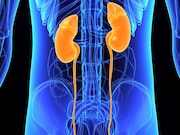Reduced risk seen for primary composite renal end point event; more frequent fluid retention, anemia reported
FRIDAY, April 19, 2019 (HealthDay News) — Atrasentan is associated with a reduced risk for renal events in patients with type 2 diabetes and chronic kidney disease, according to a study published online April 14 in The Lancet to coincide with the International Society of Nephrology World Congress of Nephrology, held from April 12 to 15 in Melbourne, Australia.
Hiddo J.L. Heerspink, Ph.D., from the University of Groningen in the Netherlands, and colleagues conducted a randomized trial at 689 sites in 41 countries. Adults aged 18 to 85 years with type 2 diabetes and chronic kidney disease were enrolled and given atrasentan 0.75 mg orally daily during an enrichment period before random assignment. Those with a urine albumin-to-creatinine ratio decrease of at least 30 percent with no substantial fluid retention were randomly assigned to atrasentan 0.75 mg orally daily (1,325 participants) or placebo (1,323 participants).
The researchers found that during a median follow-up of 2.2 years, 6.0 and 7.9 percent of patients in the atrasentan and placebo groups, respectively, had a primary composite renal end point event (hazard ratio, 0.65; 95 percent confidence interval, 0.49 to 0.88; P = 0.0047). Fluid retention and anemia occurred more frequently in the atrasentan group. Overall, 3.5 and 2.6 percent of patients in the atrasentan and placebo groups, respectively, had hospital admission for heart failure (hazard ratio, 1.33; 95 percent confidence interval, 0.85 to 2.07; P = 0.208).
“Data from this study and other trials with endothelin receptor antagonists could define the position of this class in the future treatment armamentarium of the diabetes population with high renal and cardiovascular risk,” the authors write.
Several authors disclosed financial ties to pharmaceutical companies, including AbbVie, which manufactures atrasentan and funded the study.
Copyright © 2019 HealthDay. All rights reserved.








